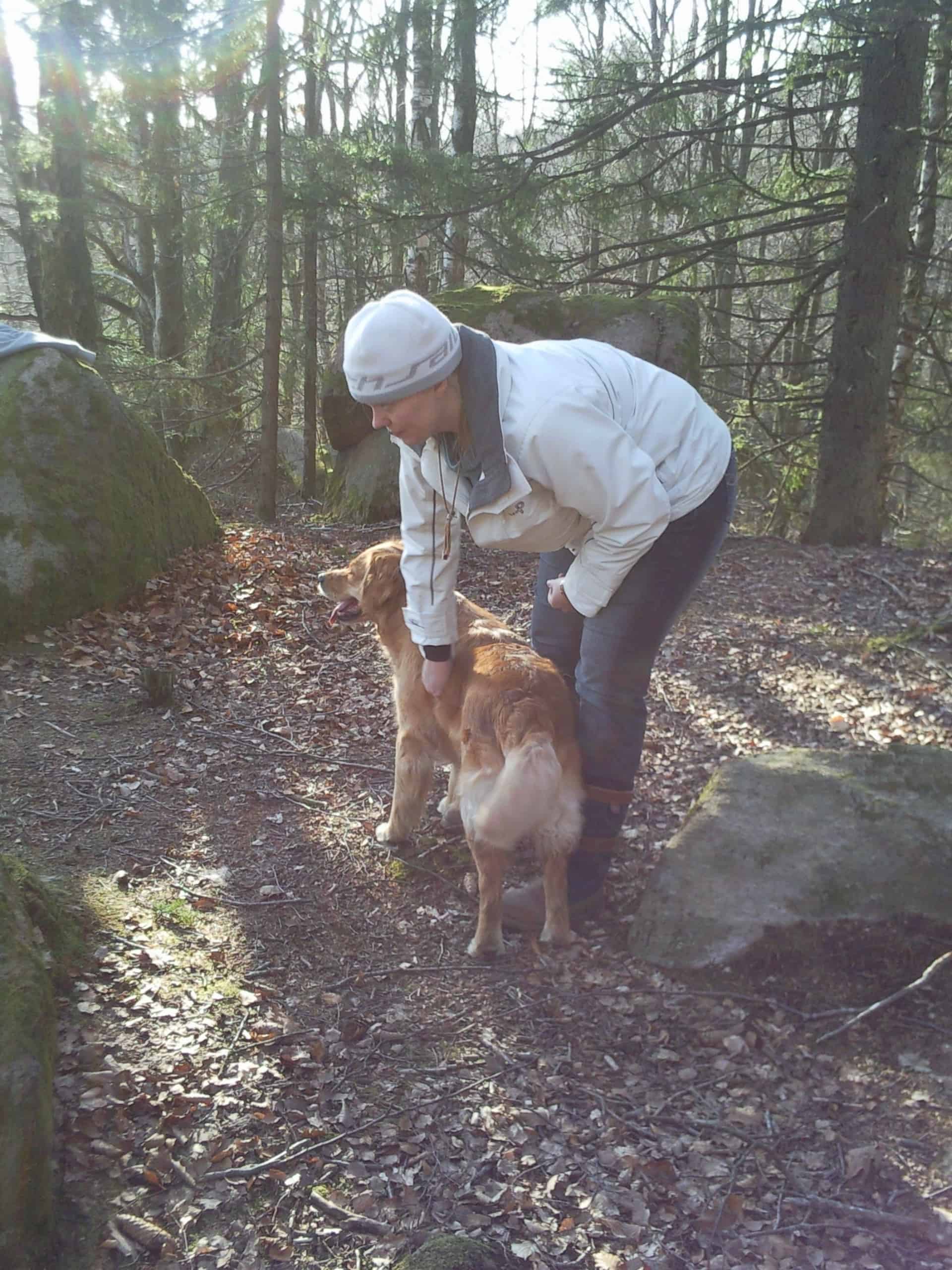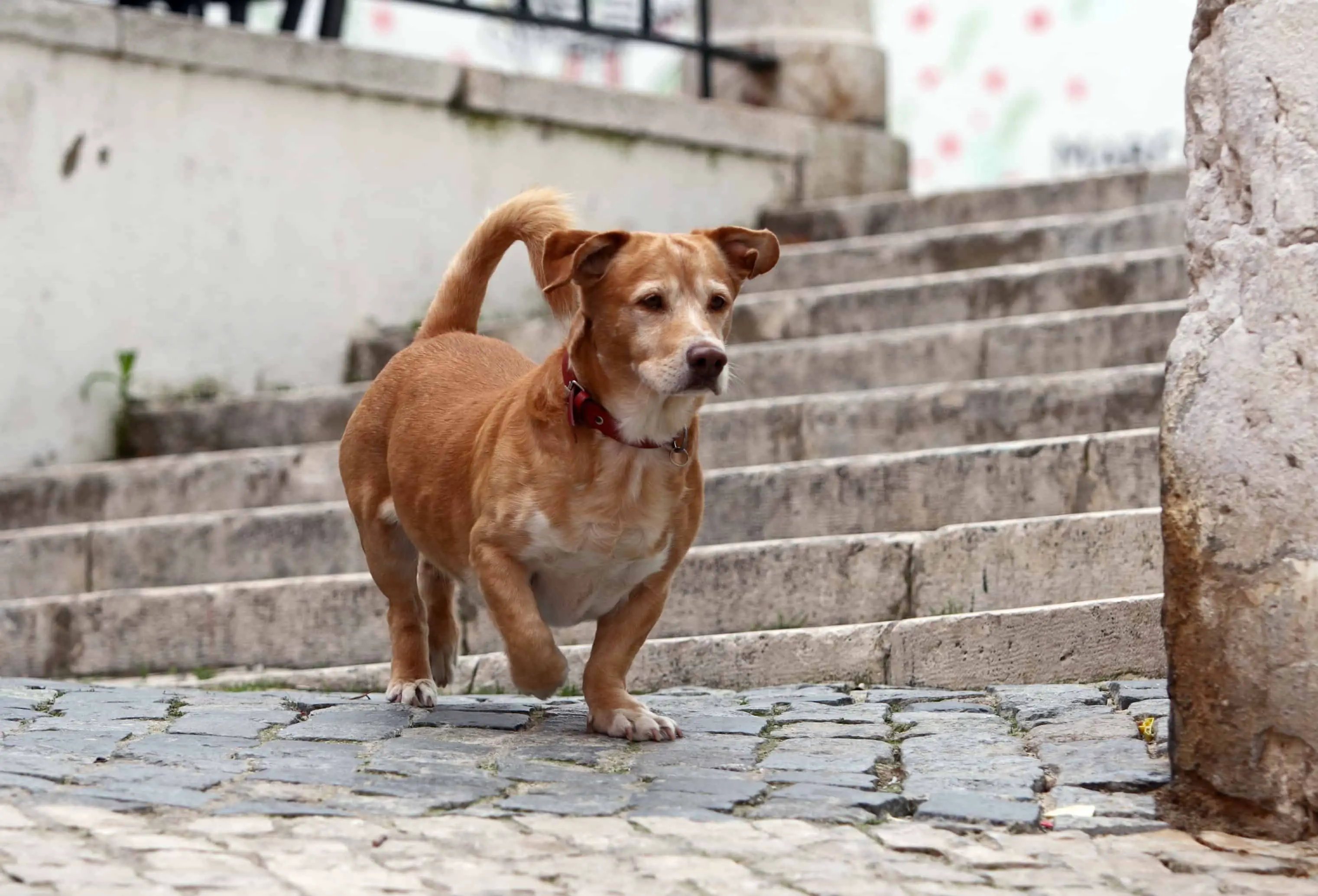Best flea control for golden retrievers
When treating our Goldens we have had great success with Frontline Plus but you will find that there are many good brands that offer similar results. Remember that Frontline Plus works the best on larger dogs, so if you have a smaller dog breed, you might want to look into other alternatives.
We have had mixed results with flea collars, so we are hesitant to recommend them. Furthermore, we don’t like to put collars on our dogs if it isn’t for walking activities. Collars are uncomfortable for the dog, and especially stressful for a puppy. We simply avoid them if possible.
Recently there are many pills and tablets on the market that supposedly give instant tick protection for puppies or dogs. Since this market is quickly changing we simply recommend that you ask your local vet before you make any purchases. All products are clearly supposed to be tested and regulated, be we would still be hesitant to most of these products since it’s tricky to know the ingredients and their cause and effect on your dog.
Same goes for many other tick prevention products such as sprays or shampoos. We have not find them useful because to be fair, we have not yet needed to. They simply add inconvenience to the ”flea equation”, and you know what they say: If it ain’t broke, don’t fix it.
How do puppies get fleas?
Now we believe it is pretty much impossible to fully protect your darling puppy from exposure of disgusting ticks and fleas. Fleas or other parasites can and will come in contact with your furry little friend in one way or another.
First off, if you have a yard like us that you like to have your puppy exercised in, your dog will be exposed to the parasites of other animals. Rodents, birds and other animals could carry ticks and other creatures that can transfer to your puppy if they have been in your yard. Now, we believe that yards are great for your dog, especially if they are enclosed. Because of this we would never compromise on letting our dogs have access to the yard.
Secondly, ticks and fleas could come from humans as well. Because they are canny, the parasites will grab on to any available host, and then travel on this host until they find a tastier subject. As a consequence, any of the guest invited to your home could potentially have unwanted guests that spread to your dog.
Moreover, every time you take your puppy outside the door it will be a target for parasites of all kinds. We have made it habit of ours to do a preliminary check for ticks after every long walk or outdoor exercise that we do. Make sure to do this more during the warmest months of the year, since that is when there are the most parasites crawling around. For once we Swedes can be cheerful for our long winters! ”Yay” we suppose!
Especially make sure to feel and look for parasites around the neck and ears of your dog, since that will be one of the favorite spots for these hazards bite down upon.
Also, make sure to look closely around the face of your dog, since it can be a painful process to remove ticks from the area around the eyes of dog.

We always check our dogs for ticks after our walks, but before we let them inside the house again!
How to get rid of fleas on puppies 2 or 3 weeks old
If you are lucky enough to have a little baby puppy at home you might want to ask yourself this question. Puppies are like candy to fleas, and you want to protect them as soon as possible. When the puppy is newborn, its soft skin and baby fur provides the perfect place for these parasites to populate.
Unfortunately, puppies that are only a few weeks old cannot be treated the same way as older dogs, because of the strong contents of flea preventions. The undeveloped bodies of puppies simply cannot handle the side effects of the treatments. So how do you prevent or get rid of the fleas?
There are several steps to ensure that your baby pup does not get populated by fleas:
- Keep the puppy in a protected enclosed area for as long as possible. For the first weeks, it is okay to limit the exposure to the outside world of the puppy. Since it will want to spend time with its mother anyway, it wont complain too much about staying in the crib for some time.
- Inspect the puppy often to see if there are signs of parasites. You should be feeling the pup a lot in the beginning anyway to build a relationship with the puppy as well as with its mother. Inspecting the pup is also important to quickly recognize if there are signs of other health problems.
- Bathe the puppy to keep it clean and to remove fleas manually if there are any. Just use a bowl of lukewarm water and use your hands to scope water on the pup.
- After bathing the puppy, you should groom it with a flea comb. Be thorough and start with the head, then systematically move downwards as you search for unwanted parasites.
- Kill all parasites you found by squashing them or throwing them into hot water. Just get a pot of boiling water and have it close by when grooming your puppy. Then let the unwanted guests go for a swim.
- Finally, make sure to also treat the mother of the pups and change the bed or interior of the puppies housing so that it is clean and parasite-free. If necessary, you could use flea spray or a flea trap nearby the housing of your puppies. This would lower the chance of them being infected even further.
How to get rid of fleas on puppies under 12 weeks
About 12 weeks is the crucial age when your puppy has grown enough to be treated with most flea prevention products on the market. When under 12 weeks it is important that you as dog owner take caution in what products you use on your puppy.
When to start flea and tick treatment for puppies
So this becomes a tricky question since it depends on numerous factors. We are sorry to give this cop-out answer, but even if we tell you what works for us, it might not be optimal for your puppy. For most breeds, 7-8 weeks is the cut off for when you can start treating the puppy with anti-flea products. We go by this rule for most of our puppies, and it has worked out good for us.
There MAY however be breeds or individuals that cannot be given prevention treatment as early, and if you are uncertain you should always check with your breeder or your local vet. Be extra careful if the anti-flea product is clearly trying to label itself as a product that is useable on pups less than 7 weeks old. You never want to take unnecessary risks when it comes to the health of you little fur ball.
Can an 8 week old puppy wear a flea collar?
At Puppyton, we don’t recommend this. For several reasons we simply prefer that our puppies wear topical flea treatments. Like we have said before, flea collars show mixed results from our experience. And more importantly, we simply don’t like to use collars on our dogs if we don’t have to. We like to think that collars should be representative of exercise, training, work and reward for the dog. Messing with the inauguration of this at an early age is not good in our opinion.
BUT, with all this being said we may just be old-school. If you find that your dogs don’t mind the collar and the collar successfully removes all fleas and ticks: Go for it!
Remember, if the fleas are left feeding on your puppy for too long, it might be dangerous for the pup. In extreme cases, fleas could cause blood loss to your puppy, making it suffer from anemia. Since the puppy is growing the most during the first weeks, you don’t want this to happen.
”I accidentally used flea shampoo on my puppy! What do I do?”
First, relax. Anyone can make mistakes. So what to do about it? Well if you noticed right away that you used flea shampoo, you should take action immediately. We would not mess around. Call your local vet and ask for advice. If there are symptoms, you should consider taking your puppy to the vet at once.
Symptoms of poisoning from the shampoo could be:
- Shivering
- No energy
- Laying down
- Irregular breathing
Can flea shampoo hurt my dog?
Unfortunately, yes. Acting too late can be dangerous for the puppy. Severe damage could be caused and you have to keep in mind that the small animals are only babies.
To avoid this, make sure to do great research on the product beforehand. There have been several brand and products throughout the years that have been called out for poisoning dogs even when used as prescribed.
Furthermore, make a habit of being careful before using a shampoo that you are grabbing for the right one. If you have many dogs like us, it’s easy to mix them up.
How soon can i give my dog another flea treatment?
For most topical flea treatments that we use, 4 weeks is the minimum treatment interval. After those 4 weeks, the flea protection is not working anymore. For time until reapplication of the flea protection, usually 1 or 2 weeks is appropriate.
That being said, the time interval will change depending on the age of the dog, breed and most importantly: the product type and brand. The most assuring way of not making any big mistakes in terms of the interval between treatments is to ask the breeder or your local vet.
What to do if flea medicine doesn’t work?
Well, first of all you should probably consider replacing the medicine for some other treatment. You have to always keep in mind what’s in the best interest of the puppy, and there is no point dwelling in what didn’t work. Do the research before buying the product, we promise it’s worth it.
Next, make sure that it is definitive that the medicine does not work. Sometimes it takes up to a few (4-5) hours before the flea protection starts working. Common signs that the fleas are still there are:
- The dog is itchy and scratches its skin
- The skin is red and inflamed
These symptoms may remain for some time until the fleas are dead. Therefore it is good to be patient when awaiting the results of the flea treatment.
”So, how long after flea treatment will my dog stop scratching?”
The answer here is still the same. Wait at least four hours, then see if you can tell improvement in the behavior of your dog or the inflamed skin. When the treatment starts working, your dog should start to calm down and the itching should slow down.
Finally, consider that you may have to wait a week or so until you give your dog treatment again. You should consult with your local vet to learn the best suitable action for your dog.
Bonus Question: How long does it take for ear mites to go away after treatment?
How lucky are you?! We know what you’re thinking: there have perhaps been more intriguing ”bonus questions” asked in the world. However, since we are on the topic of disgusting things that we dog owners all hate, we thought we’d just through an answer to this commonly asked question about ear mites.
Ear mites are pesky parasites. They can take up to 21 day to develop into adult mites. Because of this, and the fact that they are ”immune” to many treatments when they are only eggs, the treatment should also carry on for 21 day.
If you are in more of a hurry, you could try out other stronger alternative medications that are more aggressive at tackling the ear mites. Some of these are effective against the eggs as well, and they only need to be carried out for two weeks or so. You should of course ask you local vet before trying any of these medicines, to learn which treatment is the best for your dog.
Related Articles
The Best Teething Ring For Chewing Golden Retriever Puppies
Collectively, our puppies have historically more or less chewed through an entire city block by the time we write this…
Are Stairs Bad For Puppy Hips?
Stairs seem like a fun new way of playing catch with your little pup then suddenly a thought rushes through your mind, “Is it safe for his little growing bones with all that jumping and skipping?” As a pet owner, do not consider this overthinking as stairs for your...
The Best Dog Harness For Everyday Use
In the last decade, there has been a progressive growth in the popularity of the dog harness amidst all the debate. For instance, dog owners ask themselves questions, can the dogs pull? Can they break through and escape? Is training a harnessed dog necessary? Etc…...
Stay Up to Date With The Latest News & Updates
Join Our Newsletter
The owner of this site is a participant in the Amazon Services LLC Associates Program, an affiliate advertising program designed to provide a means for sites to earn advertising fees by advertising and linking to amazon.com.



